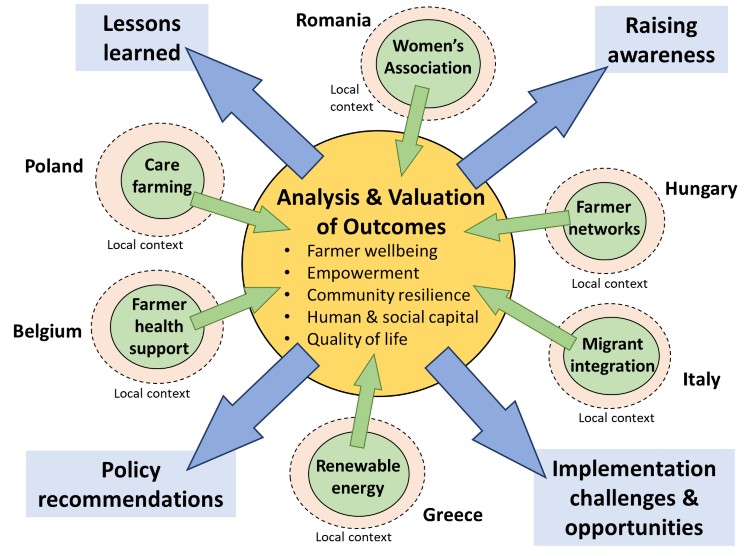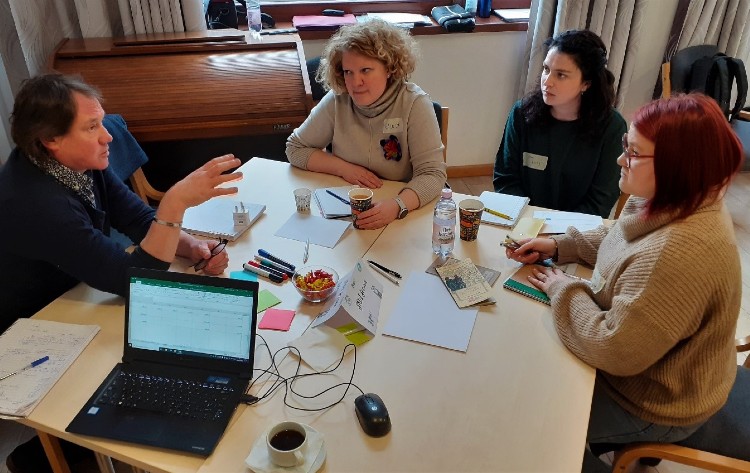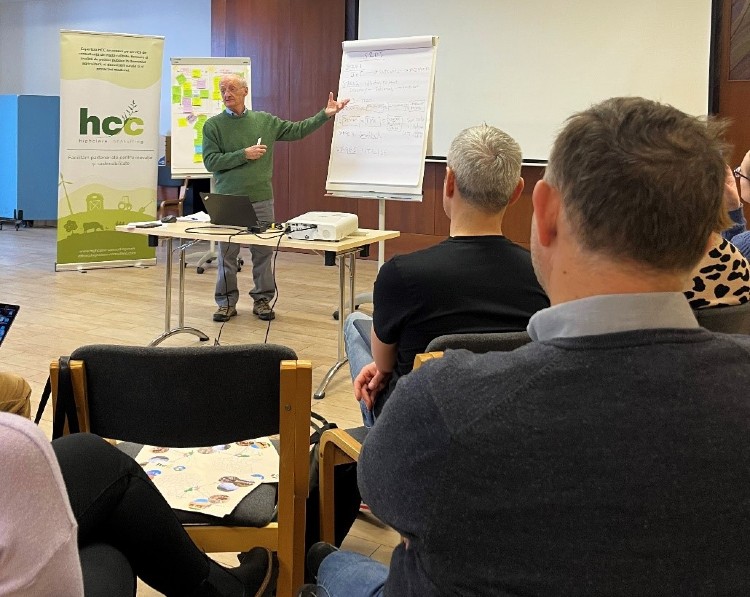FARMWELL is a European Thematic Network project funded by Horizon 2020 exploring social innovations that have capacity to improve farmer wellbeing . Recently a CCRI team attended a meeting with project partners in Brașov, Romania. This is the second blog from their trip.
Social innovation has the potential to change people’s lives in both intended and unexpected ways. Identifying and assessing the effects of innovation actions on the lives of individuals, households, or communities is more complicated than it sounds, as the impacts are not always obvious, even to those experiencing change; it does not happen instantaneously but takes place over time, as people adjust to new situations, take advantage of new opportunities and reflect on the benefits.
In short, people go on ‘journeys of change’, that may take months or even years to complete. When we analyse a group of stakeholders to ascertain the type and level of outcomes achieved through some form of social innovation, we are capturing people at different stages on their journey; some may only be at the start and the level of outcome achieved quite minimal, others may have engaged much longer, or even altered their behaviour to gain the beneficial effects much more quickly. This makes every individual stakeholder unique, and every innovative project implementation different, since no two local contexts are the exactly the same. The CCRI role in FARMWELL involves the application of Social Return on Investment (SROI) methodology to a range of social innovations being implanted in rural areas in six EU Member States (Belgium, Italy, Poland, Romania, Hungary, Greece). Each Member State case study involves analysis of one or two social innovations that have potential to improve farmer well-being, using SROI to assess the value of social outcomes generated (Figure 1). The case studies are also exploring how the activities can be brought closer to farmers, what can be learned from current implementation, and how the local context influences outcomes. It is a complex and ambitious project with SROI being utilised to explore current and forecast values of the innovative actions, which range from care farming to renewable energy, and empowerment of female farmers to provision of support for migrants.


When innovative action collides with people in a specific context over a period of time it may have limited impact, or, it may send individuals off in new directions resulting in behavioural change that catalyses a range of other outcomes. Innovation initiates a journey of change. Understanding, analysing, measuring, and valuing the outcomes from that journey forms the focus of the SROI method applied in the FARMWELL project. Our aim in the FARMWELL project is to assess the value of outcomes over a defined time period (1 to 5 years) through representative sampling of the different stakeholders benefitting from a set of identified social innovations.
Collaborative approach
A collaborative and participatory approach is essential for this kind of research. Our partners represent a wide range of organisations including: farmer advisory bodies LEADER Local Action Groups, research and consultancy organisations, universities, and farmer organisations. Located in each of the six Member States where we have case studies, it is the partners that have the language and cultural understanding of the innovation context, and are able to develop contacts with local stakeholders, both those delivering and those benefitting from, the social innovations being delivered in their areas. Our partners have spent the past year developing the evidence base for the SROI models. They created partner groups of stakeholders in their local areas, held workshops and discussion groups to draw out the journeys of change from those who were affected by the social innovations that were implemented in their areas, translated questionnaires designed by CCRI, and then collected the evidence on outcomes experienced and resources invested that was needed to populate the models with data.
The CCRI team (Paul Courtney, John Powell, Katarina Kubinakova, and Colin Baker) designed the SROI models, validated them through discussions with our partners, developed indicators for measuring outcomes, generated survey instruments for on-line and face-to-face use, collated the data, and ran the models to generate benefit-to-cost ratios assessing the monetary value of innovation outcomes in each of the case studies. In Brașov, we met up with the partners to review the data and explore the outcome values generated. We also gained additional understanding of the local context and clarified the scale and timing of investment inputs and of outcomes. When assessing outcomes generated by individual journeys of change it is critical to understand the local context, in terms of the political and economic framework in which innovations are being implemented (resource inputs, opportunities and barriers created by local, regional or national regulations, institutional barriers, and power relations). We also examined the extent to which stakeholders recognise problems and opportunities, and their capacity for making change.


The partnership meeting also examined how to utilise the evidence generated by the SROI models in local, regional and wider policy environments. Those attending met in small discussion groups throughout the first day to review the SROI model outputs, and explore options for raising awareness of the value of the outcomes generated by social innovations, what lessons could be learned, and how the information might be used to improve innovation acceptability and implementation. A key issue is the context-based significance of innovation outcomes as measured through the SROI models, which make it difficult to generalise from specific local projects to larger areas and populations. However, the case studies did demonstrate the added value of social innovation, through capturing outcomes not normally measured, and presenting the information in terms of resource inputs and outcome values that policy makers can understand.
Discussion between the project partners also suggested that simplified descriptions of the methodology and outcome values would be required to explain the complex series of processes that we had undertaken. An important element of the FARMWELL project is to provide evidence of the added value of social innovations in a specific context. Policy makers can then use the information as a foundation for analysing how similar outcomes could be generated under different socio-cultural contexts, where the stakeholder journeys of change would be different, as would the types of support required to maximise the value of outcomes.


For the CCRI team the discussions provided valuable lessons on the limits of evidence-based policymaking using SROI. But it also opened up new possibilities for how to utilise the models and present the evidence to policy audiences at different levels in more effective ways. We too, are on a journey of change resulting from collaborative interaction with our partners as we travel through the four-year time-frame of the FARMWELL project.
Visit the FARMWELL website for more information.




